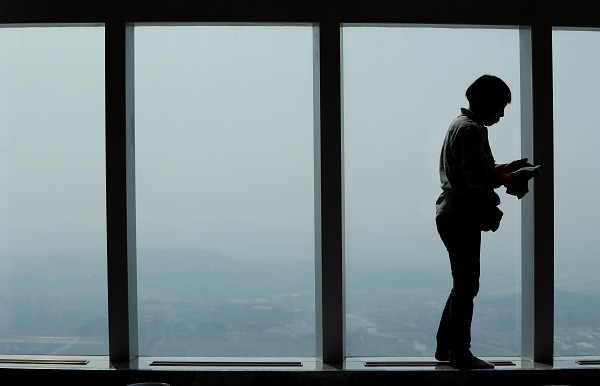Air pollution costs South Korea more than 10 trillion won ($8.9 billion) a year in lost production and other damages, with the figure feared to nearly double in about 40 years, data showed Thursday.
Air pollution causes direct and indirect damage across the board by not only harming people's health, but also affecting their leisure activity and industrial production.

According to the data by local environmental authorities, scholars and the Organization for Economic Cooperation and Development, the yearly cost of South Korea's air pollution is estimated to hover above the 10 trillion won mark.
Prof. Bae Jeong-hwan of Chonnam National University in Gwangju, about 330 kilometers south of Seoul, even put the figure at 11.8 trillion won.
The estimates measured the harmful effects of such air pollutants as particulates, volatile organic compounds, nitrogen oxides and sulfur oxides.
"According to conservative estimates, the damage from air pollution in South Korea hovers in the 10 trillion won range, but it could become much larger considering its ripple effects on consumption and industrial activity," Bae said. "It also has a negative impact on the quality of life."
Spewed out by power stations, plants and cars, particulates, also called fine dust, refer to microscopic solids and droplets that are known to cause various respiratory problems while also affecting the body's immune system.
According to the OECD, South Korea has the worst air pollution among its member countries. In a report released last year, the Paris-based club of advanced economies predicted South Korea to suffer the biggest economic damage and the highest premature death rate from air pollution among its members in 2060.
Air pollution is estimated to cost South Korea $20 billion that year, which will wipe 0.63 percent off its economic growth rate, the highest among its member nations, the OECD said.
Some local experts pointed out that the damage from air pollution could be larger that the conservative estimates, given fine dust and yellow dost that originate in China and grip South Korea nearly every spring.
Meanwhile, a series of international reports have recently been released, pointing to the serious level of South Korea's air pollution. Seoul ranked No. 3 among large cities worldwide in terms of air pollution on Tuesday. According to pollution monitoring website AirVisual, Seoul had an air quality index of 174, trailing those of New Delhi (194) and Dhaka (193).
According to the Health Effects Institute, a US non-profit specializing in research on the health effects of air pollution, the annual average density of particulates in South Korea stood 29 micrograms per cubic meter, the second-worst level among the OECD members after Turkey. (Yonhap)








![[Graphic News] More Koreans say they plan long-distance trips this year](http://res.heraldm.com/phpwas/restmb_idxmake.php?idx=644&simg=/content/image/2024/04/17/20240417050828_0.gif&u=)
![[KH Explains] Hyundai's full hybrid edge to pay off amid slow transition to pure EVs](http://res.heraldm.com/phpwas/restmb_idxmake.php?idx=644&simg=/content/image/2024/04/18/20240418050645_0.jpg&u=20240419100350)





![[From the Scene] Monks, Buddhists hail return of remains of Buddhas](http://res.heraldm.com/phpwas/restmb_idxmake.php?idx=652&simg=/content/image/2024/04/19/20240419050617_0.jpg&u=20240419175937)

![[KH Explains] Hyundai's full hybrid edge to pay off amid slow transition to pure EVs](http://res.heraldm.com/phpwas/restmb_idxmake.php?idx=652&simg=/content/image/2024/04/18/20240418050645_0.jpg&u=20240419100350)

![[Today’s K-pop] Illit drops debut single remix](http://res.heraldm.com/phpwas/restmb_idxmake.php?idx=642&simg=/content/image/2024/04/19/20240419050612_0.jpg&u=)